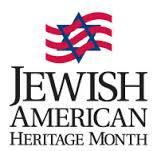Jewish American Heritage Month is a month to celebrate the contributions Jewish Americans have made to America since they first arrived in New Amsterdam in 1654, according to the Library of Congress.
Family Research
Ancestry.com has partnered with JewishGen®, the American Jewish Joint Distribution Committee (JDC), the American Jewish Historical Society and The Miriam Weiner Routes to Roots Foundation, Inc. This partnership offers the world’s largest online collection of Jewish historical records, according to Ancestry.com.
Some of the collections include:
The United States Holocaust Memorial Museum
The US Holocaust Memorial Museum offers many educational tools online at http://www.ushmm.org/. Included in the collections, is a Holocaust Survivors and Victims Database. There I found Zofia Hruszczak. I have stumbled upon Zofia before but have not made a direct connection, other than the last name. Zofia's location is listed as "Stryj, Distr Galizien" and the address is listed as "Zielowa." The source is marked as Liste XIV, which the site describes as "List of persons in various camps and ghettos in Poland. Includes name, current location and address."
World Memory Project
The World Memory Project is another great resource.
DNA
According to Ancestry.com, I have a trace amount of European Jewish DNA. It's less than one percent. The primary regions for this background are: Poland, Belarus, Ukraine, Russia, Hungary, and Israel.
Family Research
Ancestry.com has partnered with JewishGen®, the American Jewish Joint Distribution Committee (JDC), the American Jewish Historical Society and The Miriam Weiner Routes to Roots Foundation, Inc. This partnership offers the world’s largest online collection of Jewish historical records, according to Ancestry.com.
Some of the collections include:
- Belarus, Minsk, List of deaths
- 1889 Miriam Weiner Eastern European Archival Database
- Lithuania: List of Donors to Charity from HaMagid, 1871-72
- Munich, Vienna and Barcelona Jewish Displaced Persons and Refugee Cards, 1943-1959 (JDC)
- Hungary: Jewish Census, 1848
- Russia: Duma Voter Lists, 1906-07
- Jewish Given Name Variations
- Brooklyn Hebrew Orphan Asylum Records, 1878-1969 (AJHS)
- New York Hebrew Orphan Asylum Records, 1860-1934 (AJHS)
The United States Holocaust Memorial Museum
The US Holocaust Memorial Museum offers many educational tools online at http://www.ushmm.org/. Included in the collections, is a Holocaust Survivors and Victims Database. There I found Zofia Hruszczak. I have stumbled upon Zofia before but have not made a direct connection, other than the last name. Zofia's location is listed as "Stryj, Distr Galizien" and the address is listed as "Zielowa." The source is marked as Liste XIV, which the site describes as "List of persons in various camps and ghettos in Poland. Includes name, current location and address."
World Memory Project
The World Memory Project is another great resource.
DNA
According to Ancestry.com, I have a trace amount of European Jewish DNA. It's less than one percent. The primary regions for this background are: Poland, Belarus, Ukraine, Russia, Hungary, and Israel.

Comments
Post a Comment